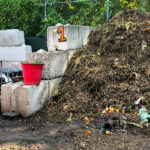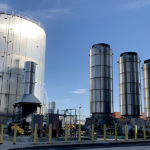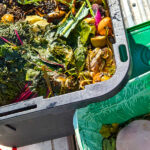The City of Cambridge launched a pilot residential food scraps collection program in 2014. It was one of the early adopters of a dedicated curbside cart for food scraps. In 2018, the program was expanded citywide. In March 2020, collection was suspended to comply with social distancing protocols that also required the Department of Public Works (DPW) to reduce the number of staff in trucks, further limiting capacity for curbside collection. Throughout the suspension, Cambridge’s 5 food scrap drop-off sites remained opened, diverting 500,000 pounds of food waste. Recently, Cambridge announced the curbside program is restarting the week of May 17.
Food scraps collection is available to all residential buildings with city trash collection. The curbside program serves more than 25,000 households citywide. The city provides curbside carts and indoor kitchen bins; households are allowed to use certified compostable liner bags or paper bags in the bins. All food scraps, as well as soiled paper, are accepted. “The curbside program is a key part of our waste reduction efforts,” notes Cambridge City Manager Louis A. DePasquale. “More than 30% of household trash is food waste; separating food waste from the trash helps fight climate change and manage increasing waste disposal costs.”
The City’s Department of Public Works (DPW) hauls about 7 tons/day of food scraps and soiled paper to Waste Management’s Centralized Organic Recycling (CORe) facility in Charlestown (MA). After the food waste is processed and slurried (the facility receives around 100 tons/day), it is delivered to the Greater Lawrence Sanitary District (GLSD) in North Andover (MA), and blended with municipal biosolids in GLSD’s anaerobic digesters. The treated biosolids are dried and sold as a pelletized fertilizer product. The biogas is used to generate electricity and heat.










